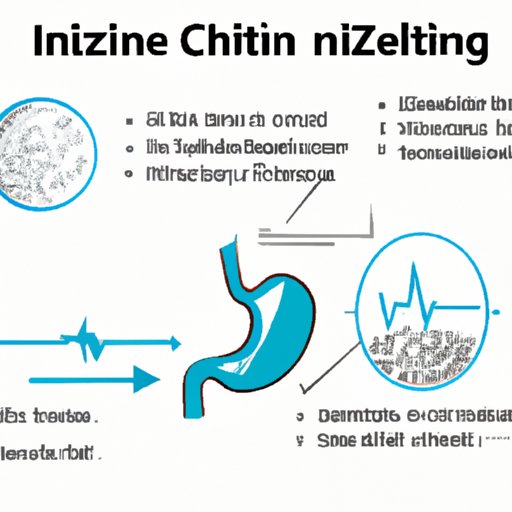I. Introduction
Zinc is an essential mineral that plays an important role in immune function, DNA synthesis, and wound healing. However, for some people, taking zinc supplements or consuming zinc-rich foods may lead to a common side effect: nausea. If you’re wondering why does zinc make me nauseous or how to alleviate this symptom, keep reading to learn more.
II. Causes of Zinc-Induced Nausea: A Comprehensive Guide for Readers
Zinc is a micronutrient that is found in many foods, including meat, seafood, and legumes. While zinc is essential for the body, consuming too much of it can cause adverse effects, including nausea. When you ingest zinc, it enters your bloodstream and can interact with other substances in the body, leading to various symptoms.
One common theory for why zinc can cause nausea is that it irritates the lining of the stomach, leading to inflammation and discomfort. Additionally, some people may be more sensitive to the effects of zinc, particularly if they have a zinc deficiency or if they are taking high doses of zinc for prolonged periods. Finally, certain groups may be more prone to experiencing nausea after taking zinc, such as pregnant women or older adults.

III. Zinc Intake and its Effect on the Stomach: A Scientific Perspective
When you consume zinc, it travels to the intestines, where it is absorbed into the bloodstream. However, if you take too much zinc or take it on an empty stomach, it can cause irritation to the stomach lining, leading to nausea, vomiting, or other gastrointestinal symptoms. In scientific studies, researchers have examined the impact of zinc on the stomach lining, and some have found a correlation between high doses of zinc and stomach irritation.
Additionally, research suggests that different forms of zinc can impact the stomach differently. For example, zinc oxide and zinc sulfate are more likely to cause gastrointestinal symptoms compared to the chelated form of zinc, which is bound to amino acids and may be better tolerated by some individuals. If you’re experiencing nausea after taking zinc, try switching to a different form of zinc or taking it with food to see if it makes a difference.
IV. How to Alleviate Nausea Caused by Zinc Intake: Tips and Tricks
If you’re experiencing nausea after taking zinc, there are several simple measures that you can take to alleviate your symptoms. For example, you may try drinking more water, taking smaller doses of zinc, or taking your zinc supplement with food. In addition, some people find that certain foods or supplements can help alleviate their nausea, such as ginger, peppermint, or vitamin B6.
If you’re looking for an alternative form of zinc that may be better tolerated, consider trying chelated zinc or zinc picolinate, which have been shown to cause fewer gastrointestinal side effects compared to other forms. However, before changing your supplement regimen, it’s essential to consult with your doctor, especially if you’re taking zinc for a specific medical condition.
V. Common Side Effects of Zinc Supplements: Nausea and More
Nausea is just one of the many side effects that can occur when taking zinc supplements. Other common symptoms may include vomiting, diarrhea, abdominal pain or discomfort, and headaches. Depending on the dose and duration of zinc intake, these symptoms may be more or less severe.
While zinc is generally considered safe in recommended doses, it’s important to take it in moderation and under medical supervision. Taking too much zinc can lead to toxicity, which may cause serious symptoms, such as fever, fatigue, or kidney damage.
VI. Zinc and the Digestive System: Uncovering the Connection
Zinc plays a crucial role in maintaining digestive health. For example, it helps the body produce enzymes that break down carbohydrates, fats, and proteins, which are necessary for optimal digestion. Additionally, zinc helps support the gut microbiome, which is the collection of bacteria that live in the digestive tract and play a crucial role in immunity, metabolism, and overall health.
However, if you’re experiencing nausea after taking zinc, it may be a sign that your digestive system is not tolerating it well. In some cases, taking zinc supplements may even disrupt the balance of gut bacteria, leading to further symptoms.
VII. Nausea After Taking Zinc: When to Seek Medical Attention
If you’re experiencing severe nausea or vomiting after taking zinc, it’s essential to seek medical attention, particularly if you’re pregnant or have an underlying medical condition. In some cases, nausea may be a sign of zinc toxicity or an allergic reaction, which require immediate medical attention.
If you’re experiencing mild to moderate nausea, it’s still a good idea to talk to your doctor about your symptoms, especially if you’re taking other medications or supplements that may interact with zinc.
VIII. The Most Effective Remedies for Nausea Caused by Zinc Intake
If you’re looking for the most effective remedies for nausea caused by zinc intake, consider trying natural remedies, such as ginger, peppermint, or chamomile tea. In addition, over-the-counter medications, such as antacids or antiemetics, may help alleviate your symptoms.
If you’re experiencing persistent nausea or vomiting, your doctor may recommend further tests or treatments to address the underlying cause of your symptoms.
IX. Conclusion
In conclusion, if you’re experiencing nausea after taking zinc, it’s essential to understand the underlying causes and take steps to manage your symptoms effectively. By switching to a different form of zinc, taking smaller doses, or using natural remedies, you may be able to alleviate your symptoms and continue to enjoy the health benefits of this essential mineral. However, if your symptoms persist or worsen, it’s essential to seek medical attention to rule out any underlying medical conditions or toxicities.
